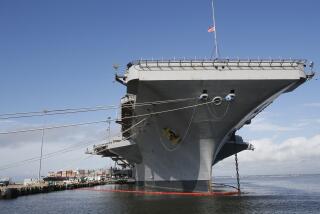Collision With the Navy Gives Insight Into Perot : Military: ‘Textbook’ officer impressed many, but frustrations led him to seek an early release from duty.
- Share via
WASHINGTON — They remember him well, the smiling, straight-arrow, undeniably homely kid from Texarkana, Tex., who reported aboard the destroyer Sigourney fresh from four years at the U.S. Naval Academy. “He looked like a Boy Scout,” recalls Richard Madden, a San Francisco stockbroker who was an enlisted man on the destroyer on that day in June, 1953.
No one would have suspected that the fresh-faced young man would someday be a billionaire--and currently a maverick presidential contender--but even then, Madden recalls, Ens. Henry Ross Perot seemed a natural-born leader. “Most of the officers were weak,” Madden says. “Perot just outshone them all.”
Madden wasn’t the only one on the Sigourney who thought Ross Perot was something special. Commander Bernard A. Lienhard, the ship’s highly respected, by-the-book skipper, was so impressed with the lad that he quickly promoted him to engineering officer--a billet traditionally reserved for officers with several years’ experience.
But that all changed in late 1954, when Lienhard went on to a new duty assignment and was replaced by Gerald J. Scott, a commander with a different approach to command. Within a few months, Scott and Perot were hopelessly at loggerheads, and Perot was taking steps to get out of the Navy early.
The young officer’s efforts to have his term of service shortened, discovered in the files of the Lyndon B. Johnson Library, have become a point of controversy in recent days. His commitment to serve was a contractual condition of his admission to Annapolis and the free education he received there. Critics have charged that Perot’s actions raise questions about his character; they have compared the incident to the flap surrounding Arkansas Gov. Bill Clinton’s efforts to avoid the draft in the late 1960s.
There also have been intimations that Perot, whose cotton-broker father fired off letters seeking help from his congressman and senator, both powerhouses in Washington, tried to use undue political influence to obtain the early discharge. And some have suggested that Perot may have played loose with the facts in claiming he sought the early discharge because the Sigourney’s captain had improperly asked him to violate Navy rules.
But Perot supporters contend that everything was proper and that the experience is simply further evidence that Perot has always been determined to do what he feels is right to deal with a situation that he believes is intolerable, even if it takes unconventional measures.
It’s difficult to prove conclusively which interpretation is correct. The Navy records needed to answer crucial questions are confidential, many of the key players have died and Perot’s campaign organization did not respond to requests for information.
But interviews with many ex-shipmates make clear that, whatever else occurred, there was a dramatic collision of cultures between Perot and the military institution he had chosen for his career. And the nature of that collision provides valuable insights into the man who now would be President.
The tale of Ross Perot’s brief career in the Navy begins in his hometown of Texarkana, where, as a freshman at the local junior college, he first decided to apply for admission to the Naval Academy.
Getting there wasn’t easy. Admission to the service academies required a nomination by the candidate’s congressman or senator, and Perot didn’t make the cut until sometime in his sophomore year. When another Texarkana youth changed his mind about attending, Perot won his slot--apparently because of his persistence in applying and reapplying.
Annapolis seems to have provided Perot with everything he needed to thrive. The strict discipline and high standards were an extension of the environment that his parents had fostered at home, and the summer cruises on board ship provided the right amount of adventure. He graduated as a “six-striper”--midshipman battalion commander--the academy’s highest honor.
Kenneth (Scotty) McDill, a retired pharmaceuticals salesman who was a young officer on the Sigourney then, remembers the day that the new “boot” ensign reported aboard, resplendent in his dress blues. While most new ensigns stick out as green recruits, Perot “was spic-and-span, sharp as a tack,” McDill recalls. “Strictly Naval Academy stuff,” he says.
Perot’s first 15 months aboard the destroyer clearly met his own high expectations. Crew members describe the then-captain, Bernard Lienhard, as a near-perfect “textbook” officer: stern, by-the-book and meticulously fair--just what Perot had been taught was the role model for naval officers. It was no surprise to anyone that the two got along well. Perot himself was virtually a Lienhard clone.
Ed Ditzel, a former enlisted man on the Sigourney, recalls that en route to Korea that month, when the ship was technically on alert status, “a lot of us took the watches lightly, but (Perot) thought that every man should be there and take them seriously. He was strictly by the book--there was no deviating.”
McDill also remembers Perot as “a very religious young man” who clearly was uncomfortable with the drinking and profanity that was widespread in the Navy--and occasionally complained about it to other junior officers. “I know that it upset him,” McDill recalls, “but he kept his mouth shut about most of it”--at least during his first 15 months.
Whatever his frustrations, Perot’s impact during that time was impressive, particularly for a mere ensign. Well before Lienhard promoted him to chief engineer, he was giving the young officer glowing fitness reports. And Perot apparently won the respect of officers and enlisted men alike.
“My father often said over the years that Ross Perot was the finest junior officer who ever served under his command,” says John B. Lienhard, a Washington-area real estate broker who was 9 years old and a frequent visitor to the Sigourney when his father, who died in 1989, was commanding officer.
Blaine Irvin, a former enlisted man on the Sigourney, agrees with the now-dead skipper’s assessment of Perot. “He was very, very smart, he really was on top of things and he played no favorites,” Irvin recalls. “We admired him quite a bit (more than) the rest of the officers.” Everyone assumed that Ross Perot would make the Navy a career.
But everything seemed to go wrong for Perot when Lienhard’s tour of duty ended and Scott took over as the Sigourney’s captain. By all accounts, the two skippers couldn’t have been more different: If Lienhard was a “textbook” officer, Scott was far more relaxed, and apparently less a stickler for regulations.
Precisely what happened to push Perot into wanting to leave active duty early still is buried in the Navy’s records, but it’s clear that, from Perot’s viewpoint, at least, the new commander did not fit the model that he had been taught to expect.
Without specifically naming Scott, Perot told Newsweek in an interview recently that one clash came when the Sigourney’s skipper ordered him to use part of the crew’s recreation fund to decorate the captain’s stateroom, and Perot refused. “I wouldn’t do it,” he told the magazine. But he didn’t provide any further details.
He also implied that the captain frequently sought liquor from the ship’s medicinal stock--a practice strictly verboten on all U.S. naval vessels--for private use. “If we were at sea any length of time, he wanted liquor,” the interview reads. Again, however, there is no elaboration.
For his part, Scott vehemently denies these charges, and insists that he can’t recall very much about Perot at all. “This was all 37 years ago,” he said in an interview. “I can’t say as how I remember him or any of the other junior officers on board.” Perot himself has shed no new light on the issue.
But Leo G. Roell, also a junior officer at the time, recalls several incidents that he says Perot related to him that may illustrate the two men’s differences: In one, while the Sigourney was tied up, Scott reportedly ordered Perot to take a bundle of structural parts that clearly belonged to another ship. Perot refused, complaining that “that would be stealing.”
In another, Roell says Perot told him he was once called in by Scott and questioned about why he had placed fish on the wardroom menu for Friday. Stunned, Perot explained that fish was nutritious, and he had scheduled it for Friday in deference to the ship’s Roman Catholic officers. Scott reportedly said OK--” ’but I don’t want you to have it served on Fridays.’ ”
Scott admits to not liking fish, but denies that the wardroom episode--or the structural parts incident--ever occurred.
It didn’t take long before Perot began to show signs of disenchantment. Mike Conti, who was an enlisted man on the Sigourney in those years, recalls the then-Lt. (j.g.) Perot interrupting his daily jogging session on the main deck one morning to stop and chat, and longing wistfully for a more squared-away environment.
“I wish I was in the Marine Corps,” Conti says Perot remarked.
The rest--or, at least part of it--is history. In April, 1955, Perot formally asked that he be released from active duty that June--his second anniversary in the fleet--confessing bluntly that he had become disillusioned with the Navy and had decided to pursue a civilian career instead. Keeping him in would benefit no one, he asserted.
Even more candid--and now controversial--was an earlier draft that he apparently submitted, but was talked into rewriting by senior officers, that charged that the Navy he had encountered fell far short of the standards that he had been promised at the academy and that it was too much in conflict with his own philosophy for him to abide much longer.
By many standards, the gripes weren’t new ones. Promotions mean very little in the early years, Perot complained. All you had to do was breathe, and you could make lieutenant j.g., he said. There were too many officers who were more interested in looking after their careers than in getting the job done. And the merit system in force at the academy was nowhere to be seen.
But then came the kicker, in which Perot finally let loose his frustrations on immorality in the sea service. “I have found the Navy to be a fairly Godless organization,” he wrote. “I do not enjoy the prospect of . . . being subjected to drunken tales of moral emptiness, passing out penicillin pills and seeing promiscuity on the part of married men.”
He also complained about the endless profanity. “I constantly hear the Lord’s name taken in vain at all levels. The use of foul language is to me a measure of a man’s inability to express himself in good English, with the one exception of taking God’s name in vain. To me, this constitutes blasphemy.”
Although the draft letter was kept private, news that Perot wanted out surprised his shipmates on the Sigourney. McDill recalls it as a complete turnabout from Perot’s earlier career plans. “When he first came aboard, he was going to be an admiral--no ifs, ands or buts,” McDill says. “Then he got so frustrated with what he saw in the Navy.”
But the reaction continued up the chain of command. Although such grousing--and an occasional request for an early-out--is heard frequently from reservists, it rarely comes through channels from career officers, particularly those who have commanded their class battalion at the Naval Academy. By any standard, it would have deserved a closer look.
Perot’s father, also frustrated, wrote letters to members of Congress--Rep. Wright Patman (D-Tex.) and then-Sen. Lyndon B. Johnson (D-Tex.)--asking them to help win a discharge for his son. With their help, he said: “Lulu May and I are looking forward to having him back in Texarkana and Texas soon.”
But the Navy had other ideas. Vice Adm. James L. Holloway Jr., then chief of naval personnel, apparently personally summoned young Perot for an interview, and declined Perot’s request for an early discharge. Perot was transferred to the aircraft carrier Leyte, where he served out two more years.
With Perot now a major presidential contender, the incident has blown into a serious controversy. Critics have suggested that Perot was trying to evade his full four-year hitch, that he unduly tried to exert political influence to obtain his discharge and that he has played loose with the facts in charging improper demands by the Sigourney’s captain.
But more explanations will be needed before the full story can be told.
These questions remain unresolved:
* Did Perot seek to “bail out” on his obligation to serve on active duty, as some critics imply?
Perot says that the minimum requirement for active duty service was only two years when he signed up for the academy, but that the minimum tour was later extended--unnecessarily, he says, since the nation was then winding down from the Korean conflict. The Navy says it hasn’t been able to determine just what Perot’s formal contractual obligation would have been.
* Did Perot act improperly in seeking an early discharge?
Naval officers who served during the 1950s say such requests were not made routinely, but that Perot’s was not the only one in that era, particularly from men who didn’t want to make the Navy a career. Perot’s application was turned down because he hadn’t shown that his staying would cause a “hardship” at home.
* Did Perot’s father try to exert undue political influence to help his son?
Although the elder Perot wrote his congressman and senator, the practice wasn’t unusual, and he doesn’t seem to have gotten very far. Patman routinely forwarded the letter to the Navy Department, and Johnson had an aide return the letter. Both lawmakers backed the Navy’s decision as final.
* Did Perot distort the facts in alleging improprieties by the Sigourney’s commanding officer?
Scott vigorously denies the charges, Perot won’t provide any more details and the crew members interviewed by The Times were unable either to confirm or deny Perot’s story about the recreation fund and the use of alcohol.
More to Read
Sign up for Essential California
The most important California stories and recommendations in your inbox every morning.
You may occasionally receive promotional content from the Los Angeles Times.













